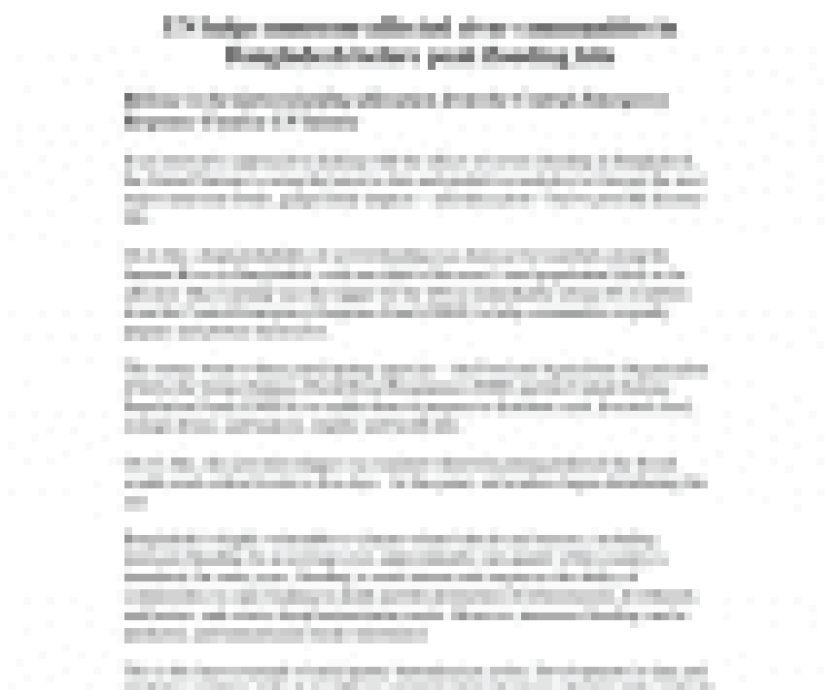Click to expand Image
An immigration detention center in the Sathorn area of Bangkok, where human rights activists believe that a group of Uyghurs are being detained, September 30, 2022.
© 2022 Jack Taylor/AFP via Getty Images
(New York) – Thai authorities should immediately investigate the death of an ethnic Uyghur asylum seeker who had spent nine years in immigration detention, Human Rights Watch said today. The case highlights the need for Thailand’s government to end the indefinite detention of asylum seekers.
On April 21, 2023, Mattohti Mattursun (also known as Muhammad Tursun), 40, died of liver failure in Bangkok’s Suan Phlu Immigration Detention Center, according to Uyghur human rights organizations. He had been detained for illegal entry since March 13, 2014.
“Thai authorities are putting people seeking refugee protection at grave risk by keeping them for years in awful conditions in immigration detention centers,” said Elaine Pearson, Asia director at Human Rights Watch. “Mattohti Mattursun’s death should sound the alarm to end this abusive policy of incarcerating asylum seekers and refugees for prolonged periods.”
As a Uyghur, Mattohti Mattursun faced persecution or other serious harm if returned to China. He was among several groups of Uyghurs who arrived in Thailand in 2014, seeking to travel to Malaysia and on to a third country. In 2015, the Thai government forcibly sent back to China 109 Uyghur men and boys, who were never heard from again. Another 170 Uyghur women and children were permitted to travel to Turkey, their original intended destination. Thailand has since detained the rest – about 50 men – in squalid immigration detention centers, where authorities treat them as illegal immigrants without any rights.
Mattohti Mattursun is the second Uyghur to die in 2023 in Bangkok’s Suan Phlu Immigration Detention Center. Aziz Abdullah, 49, died in February, reportedly of pneumonia.
Uyghurs are predominantly Muslim Turkic-speakers who live largely in the Xinjiang Uyghur Autonomous Region in China’s northwest. Since late 2016, the Chinese government of President Xi Jinping has dramatically escalated repression in Xinjiang. The United Nations Office of the High Commissioner for Human Rights has determined that the abuses against Uyghurs “may constitute crimes against humanity.”
Under Thai law, all migrants with irregular immigration status – including children, asylum seekers, and refugees recognized by the UN refugee agency (UNHCR) – can be arrested and detained for illegal entry. Many immigration detention centers in Thailand are severely overcrowded, provide inadequate food, have poor ventilation, and lack access to medical service and other basic necessities. Detainees are restricted to small cells resembling cages, where they barely have room to sit, much less sleep. Children are frequently incarcerated with adults.
Conditions in Thailand’s immigration detention facilities have long been reported to fall far short of international standards, but the Thai government has not acted to address the serious problems. Human Rights Watch documented these shortcomings in a comprehensive report on immigration detention of children in 2014, and a report on the treatment of refugees, including the detention of urban refugees, in 2012.
Thailand is not a party to the 1951 Refugee Convention and has never enacted a law to recognize refugee status and set out procedures to assess asylum claims. Given its own lack of asylum procedures, the Thai government should respect UNHCR-issued persons-of-concern documents and not detain people who have pending claims for international protection. In addition to ending the detention of asylum seekers, Thailand should adopt alternatives to detention that are being used effectively in other countries – such as open reception centers and conditional release programs.
“The Thai government should recognize that its punitive, indefinite detention policy toward asylum seekers is both inhumane and counterproductive,” Pearson said. “Locking Uyghurs up and throwing away the key will not stop them from fleeing the ghastly situation in Xinjiang, and only adds to their misery.”




